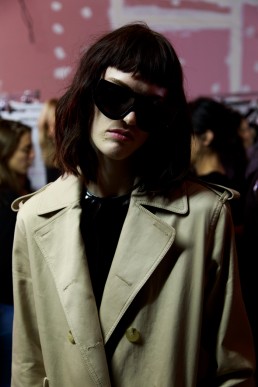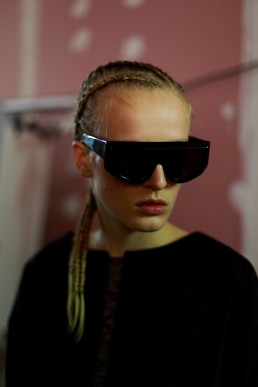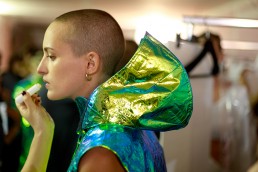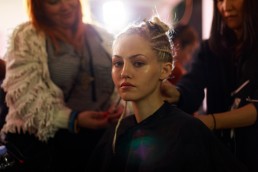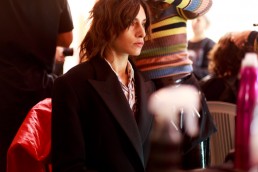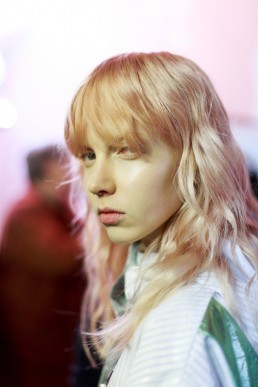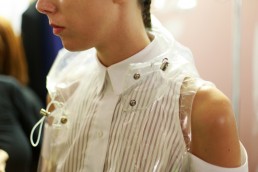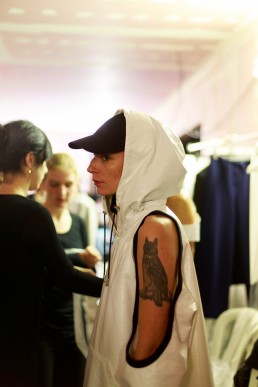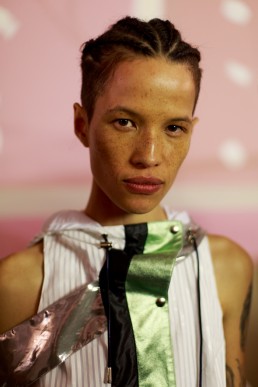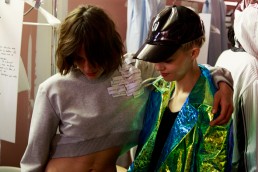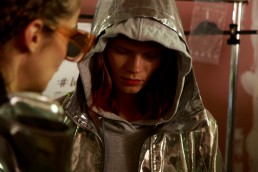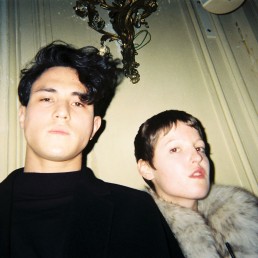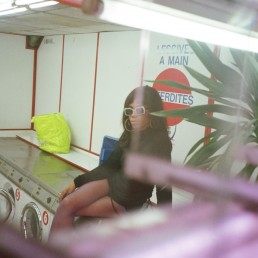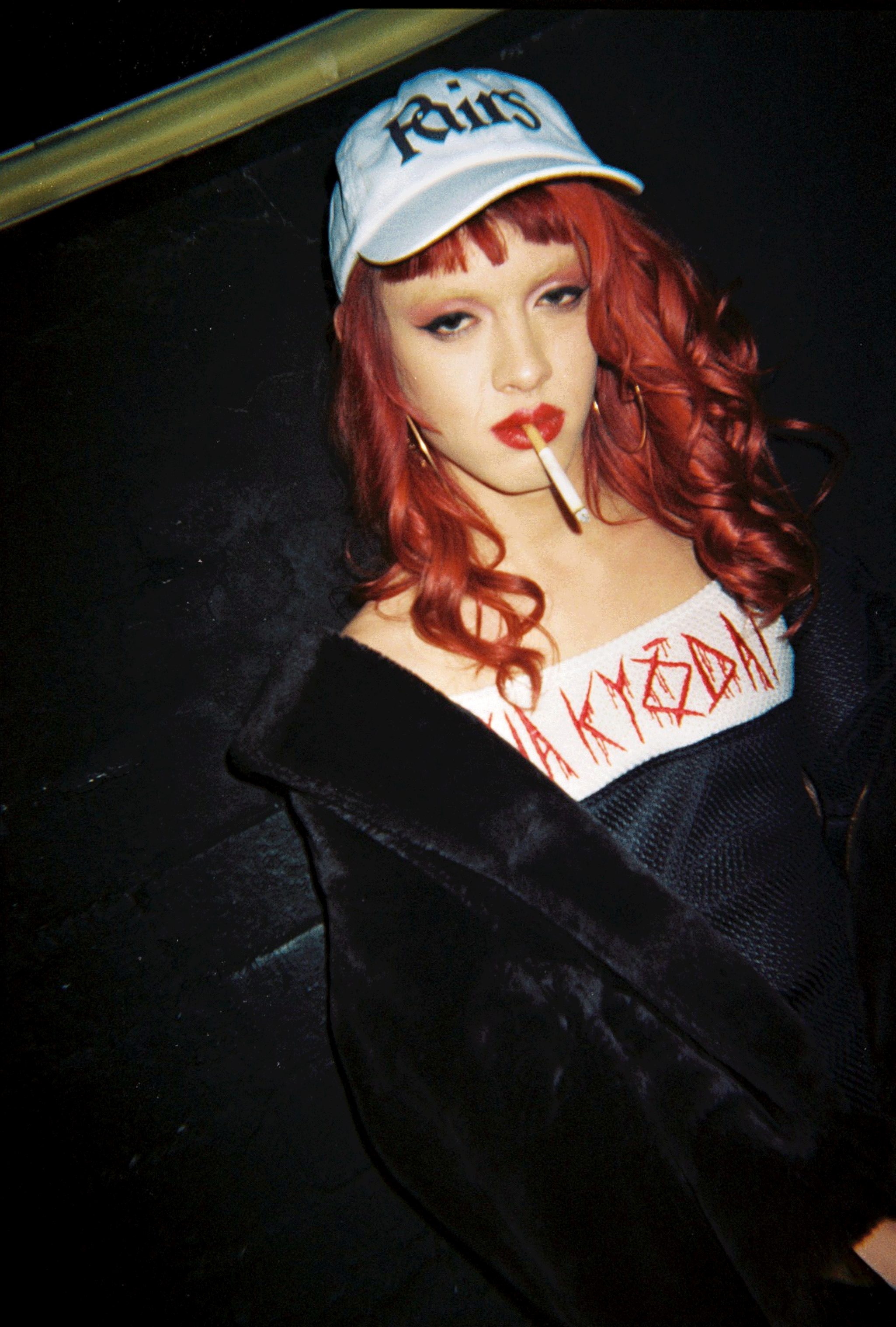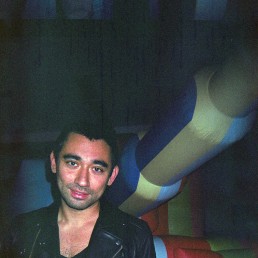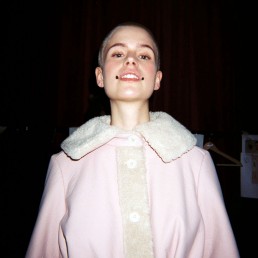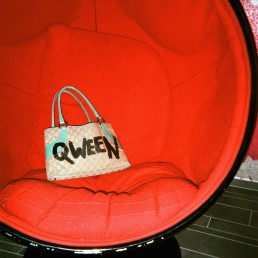Fashion editor, costume designer, video stylist, casting director and now creative director of WANDA NYLON, in fifteen years Johanna Senyk has explored diverse facets of the industry. Freshly arrived in Paris at the age of seventeen, her buoyant energy landed her jobs at Crash, L’Officiel and The Face. From there, she was sent on a collaborative journey that has seen her work with the likes of Alexander McQueen, J.W. Anderson and the Hyères International Festival of Fashion, before creating her own label.
WANDA NYLON started out with a clever strategy: to do one simple thing and do it to perfection. Exploiting the niche of the humble raincoat, she reinvented it to be androgynously cool, with a hint of obscenity. Snapped up immediately by over fifty stores including Harvey Nichols and Browns, Johanna found herself designing six collections in their first year. Over wine and cigarettes in a noisy terrace near her rue La Fayette studio, she shares her thoughts on fashion, feminism and family.
The name WANDA NYLON is very evocative, it sounds like a character in a Tarantino film. What inspired it?
I’m totally obsessed with plastic, with latex; it has something sexual. I always loved the fetish industry and I liked the feeling of a dancer’s nickname: two words, slightly tacky. I wanted to build on this in the same way. My family has Polish origins and I liked something short, ending with ‘a’ – I think these names sound more joyful. I wanted to make a link with contemporary fabric because that is the story of the brand. I thought about Acetate, PVC – PVC Jo? Then WANDA NYLON! To the ears, it had rhythm. I said yes, okay, that! And I love the idea that nobody knows who is behind the brand, that the concept and the clothes are strong enough to speak alone.
You use a lot of unique high tech materials. How involved are you in the creative development of your textiles?
With the polyurethane that I use, it took two years to develop with a factory in the US. It is something that is super difficult to make without it sticking, becoming yellow, that sort of thing. I remembered from my time on film sets that if you give a girl a plastic mini skirt, it doesn’t work. She will make too much noise. We have developed something comfortable and silent. I tried fifteen different companies; I developed my own textiles by making a lot of mistakes. Big, big brands call us and ask if they can rebuy our polyurethane. But I say no, it’s exclusive to us. Textiles I do for myself and when I perfect it, I keep it for my team. But it depends, for some special fabric it only takes between two and three months to develop.
You’ve collaborated with other artists frequently in your career. Is that something you wish to continue?
The clothes are super visual, so from the beginning I had a lot of people wanting to use them in advertising: Snoop Dogg, Rihanna, M.I.A. But I never give things away; I say if she buys it, she can take it. It’s the same for press, which surprises a lot of people. But obviously they like the clothes. Now I think we are going to have a video with Nike. They will take what we have. Step by step, if I fall in love with someone or something, when it’s a clever collaboration, I like it. If I work with someone it will be in an artistic way. It’s not a money exchange; it’s young people who like the style and energy of each other, so now I make special clothes if the collaboration is special.
Do you identify as a specifically French brand or would the WANDA NYLON DNA be the same in any cosmopolitan city, such as NYC?
I think I’m French because I feel French; I am in Paris and have worked here for a long time. Here, you have brands for super cute girls, clean, good students, smiling and inoffensive. Or you have brands for rich girls who buy LVMH, drive an Austin mini and purchase one more bag every month. I wasn’t feeling represented as a Parisian. For all my girlfriends and me, cool girls who like music, like dancing, with good energy doing things with our lives, that is not for us. So I am happy to propose something for a Parisian girl that I don’t think was being represented before. But I feel French. It is my mission to make noise here, not to go there! But I will go dance in New York, for sure.
Do you think the French fashion industry needs to diversify?
I am a little bit bored of the Parisian, always the same people proposing the same stuff. That’s why I think Paris, if you compare it with London, doesn’t have a lot of energy. Because you have a few people who are designing everything for the market, you don’t have a lot of different kinds of propositions. If you want to be credible, you have to work with this one for music, with this one for production and for lighting. New creative people, young people have less of a standard platform. We can make it different; we can do new things together!
Your models fall within a large age range for fashion, which is very rare. How do you cast your shows?
The women that we work with, we have to imagine that we are in love with them; we want them to be our girlfriend or our best friend. That was my brief: I’m not bothered with fourteen year old girls, blondes from nice suburbs. I want to have a crew of girls that I like and I don’t think I can have a girl and not like her six months later. All the girls we work with we use again and add in new people. In the same way, I can’t love a model and not love her older. Like Stella Tennant – I loved her then; I will love her in ten years, twenty years. For me the character and the attitude doesn’t change. Also, I prefer to have something that is not perfect in the clothes than a lie; I don’t want to fake it. It is a part of life and it is a part of feminism for me that you can be beautiful even if you’ve had a kid and your body or belly isn’t perfect.
They all had a wonderful energy on the runway; each girl seemed to have her own unique personality shining through.
I feel it is super interesting and super attractive to take the girls as who they are in character. For example, I have a few girls who don’t feel comfortable in a dress. I don’t want to disguise them. I want the girls to feel the clothes and be themselves. For girls, they are a little bit strong, a little bit rock and roll – they can’t be jolie madame or trop bourgeoise. I want the girls to be themselves in the clothes. We are not for shy girls!
What has been the most important development from your first collection to your latest?
Now, it’s funny, it’s a second step for the brand. I was a little bit naïve in the beginning. I came up with a concept: we will do rain clothes because there is no brand that is doing sexy rainwear. I will use plastic because for me, a jacket in plastic, everybody needs to have it – it’s like a denim jacket or a trench. But you couldn’t find these pieces! There was such a huge appetite for them; it was crazy. So the new step for me was to learn to say “stop” and to learn to say “no”. I blocked everything and I said, “I want to develop the shape, the DNA, the identity of the girls; who we are, who we want to dress, the music that we like, where are we dancing, who is fun to meet, to work with”. I decided to stop and do something deeper, more profound. To focus on the show, redo the website, to make it all more powerful. For me, this season was almost like the first season.
Is that because you feel you’re coming into your own now, you have a clear direction?
Yes. And it’s different now. In the beginning I was just making a product and now it’s not the story of a product, it’s the story of a journey! So everything changed. That’s why I say I was a little naïve to think this could be like a hobby. Now, it’s a new step. Now, people propose things and for the first time I say no! That’s the best thing that I learned, because I always thought that we have to say yes. The time you spend on something, you didn’t spend on something else. Even if it’s good, I need to focus my attention.
Do you project into the future and dream about how WANDA NYLON will be established in, say, ten years’ time?
Oh my god, ten years’ time! I hope I will have kids; that is important for me. I saw on Phoebe Philo’s website at Céline, she wrote that she stopped work, had her first kid, then her second kid in this next period – that’s on the biography. And I thought, “That is super cool to say. That when you are girls you can have a family, you can be clever, you can have an artistic point of view, do things by yourself and be independent. But to be a mother also.” So in ten years’ time, I hope I will succeed in my personal life as well, and the people who work with me also. That is the most important thing for me.
In terms of clothes and structure- play, have fun, do it more, and do it different. It would be super sad to know now where we will be in ten years’ time. Before doing something else I want to diversify the product, but I have a secret project that I am very excited about. Step by step, I want to add accessories, I want to re-inject money for new propositions. And when WANDA NYLON is strong enough and developed enough, I will want to do something different because I can’t stay quiet more than ten minutes!
Interview By Elizabeth Aaron
Photography by Kristopher Orr
